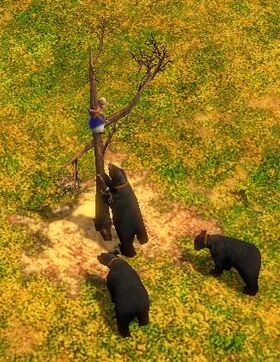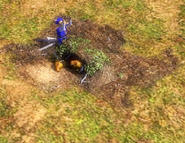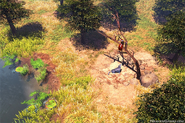mNo edit summary |
Rtrifunovski (talk | contribs) No edit summary |
||
| Line 3: | Line 3: | ||
== Overview == |
== Overview == |
||
| − | Treasures are guarded by one or more [[Treasure Guardian]]s which are |
+ | Treasures are usually guarded by one or more [[Treasure Guardian]]s which are wild animals or outlaws. The player must kill the guardians before an [[Explorer]], [[Settler]], or [[Ship]] can collect the treasure. |
{{Note|[[Alain Magnan]], the only mounted explorer in Age of Empires III, is unable to collect treasures, while the mounted Explorers in the expansions can.}} |
{{Note|[[Alain Magnan]], the only mounted explorer in Age of Empires III, is unable to collect treasures, while the mounted Explorers in the expansions can.}} |
||
Revision as of 20:22, 18 February 2020

A Settler surrounded by Black Bears
Treasures are extra items that any player can find and collect on maps in Age of Empires III, The WarChiefs, and The Asian Dynasties.
Overview
Treasures are usually guarded by one or more Treasure Guardians which are wild animals or outlaws. The player must kill the guardians before an Explorer, Settler, or Ship can collect the treasure.
- Note: Alain Magnan, the only mounted explorer in Age of Empires III, is unable to collect treasures, while the mounted Explorers in the expansions can.
Treasures may be a resource (such as food, coin, wood, and experience), a unit (such as a Pet or Settler), or upgrade (such as more hit points for the Explorer, or army).
In the The Asian Dynasties, there are Water Treasures that can be collected only by naval units in a body of water.
A peculiar set of treasures all belonging to an individual known as "El Pollo Guapo" (Spanish for The Handsome Chicken) can be found across various maps, most of which bequeath benefits to cavalry units and Explorers.
Tricks
The following hunting tricks require a map with plentiful treasures, and a degree of luck. Along with the shipment or treasure benefits it can result in killing off enemy Explorers, Envoys, Native Scouts, War Dogs, or other pets before they can accomplish much scouting or hunting themselves.
- The Aztec War Chief's experience aura, ability to convert guardians, and sending the 3-4 Pet Jaguars (Janey the Pet Jaguar) card(s).
- The Sioux War Chief's speed aura, ability to convert guardians, and sending the TEAM 4 Coyotes, 6 Coyotes, or 4 Cougars (Fang the Tame Coyote, Buttercup the Tame Cougar) card(s).
- The Iroquois War Chief's hit point aura, ability to convert guardians, and sending the 5 Pet Bears (Gentle Pete the Pet Bear) card.
- The Shaolin Master's critical hit chance, chance to convert defeated enemies into Disciples, starting Disciple, and the 5 Disciples card. Irregulars can back up the melee units.
- The dual Ikko-Ikki monks ability to stun guardians, chance to instantly kill enemies below 30 hit points, and Mountain Warrior, TEAM 2 Monitor Lizards, or 3 Monitor Lizards (Kermond the Pet Monitor Lizard) card(s). Irregulars can augment the force, and allow numerous divine strikes for the Ikko-Ikki while in melee (faster attack speed, more chances).
- The dual Brahmin's ability to heal units, inflict trample damage, stun enemies around them, and send the 2 Pet Tigers (Axehilt the Tame Tiger) card. Irregulars can support the force more safely due to the melee distraction provided by the monks, the area of effect stun, and ability of the monks to heal the Irregulars to 11 hit points prior to engaging (though they will begin losing them again until 1 hp is left, and cannot be healed again until combat has ceased).
- The Spanish civilization bonus of faster shipments, Explorer, War Dog, calling out a Minuteman army to provide support while the Explorer takes damage from guardians, unmonitored/AI early game scouts and gatherers, and still sending an economic card instead of support shipment.
History
| “ | The New World was full of hazards for even the most prepared colonists. Some settlers arrived with shockingly little in the way of supplies. Carving a niche out of the rugged wilderness was only the beginning. They faced harsh weather, bold predators, starvation, and disease. Native Americans ranged from helpful to hostile, depending on how much and what kind of contact they had already had with other European settlers. Many colonies were simply abandoned, like Popham colony in Maine; its settlers returned to England after only a year. Some, like Roanoke, vanished completely, and no one knows what happened. | ” |


